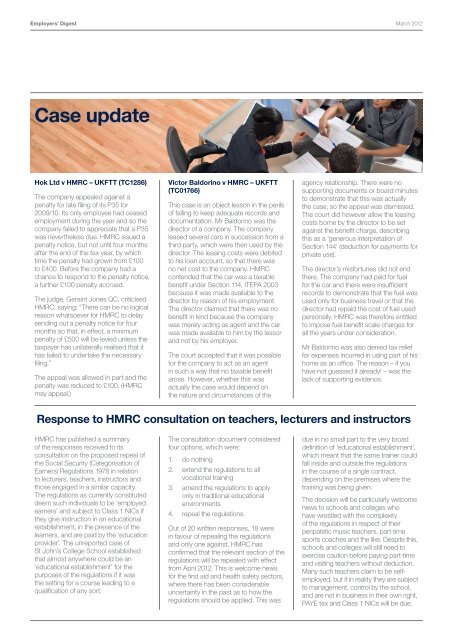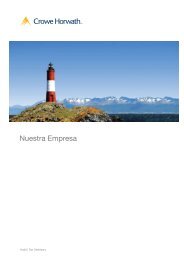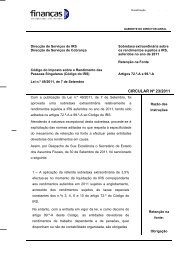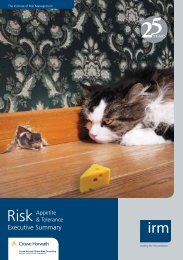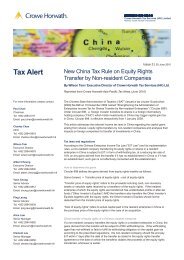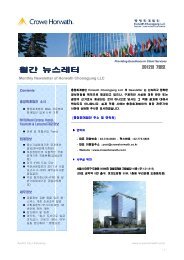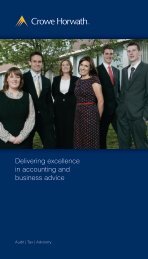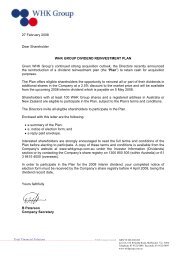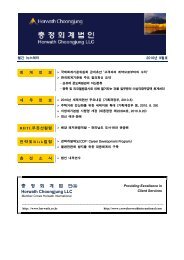Employers' Digest March 2012 - Crowe Horwath International
Employers' Digest March 2012 - Crowe Horwath International
Employers' Digest March 2012 - Crowe Horwath International
Create successful ePaper yourself
Turn your PDF publications into a flip-book with our unique Google optimized e-Paper software.
Employers’ <strong>Digest</strong> <strong>March</strong> <strong>2012</strong><br />
Case update<br />
Hok Ltd v HMRC – UKFTT (TC1286)<br />
The company appealed against a<br />
penalty for late filing of its P35 for<br />
2009/10. Its only employee had ceased<br />
employment during the year and so the<br />
company failed to appreciate that a P35<br />
was nevertheless due. HMRC issued a<br />
penalty notice, but not until four months<br />
after the end of the tax year, by which<br />
time the penalty had grown from £100<br />
to £400. Before the company had a<br />
chance to respond to the penalty notice,<br />
a further £100 penalty accrued.<br />
The judge, Geraint Jones QC, criticised<br />
HMRC, saying: “There can be no logical<br />
reason whatsoever for HMRC to delay<br />
sending out a penalty notice for four<br />
months so that, in effect, a minimum<br />
penalty of £500 will be levied unless the<br />
taxpayer has unilaterally realised that it<br />
has failed to undertake the necessary<br />
filing.”<br />
The appeal was allowed in part and the<br />
penalty was reduced to £100. (HMRC<br />
may appeal.)<br />
Victor Baldorino v HMRC – UKFTT<br />
(TC01766)<br />
This case is an object lesson in the perils<br />
of falling to keep adequate records and<br />
documentation. Mr Baldorino was the<br />
director of a company. The company<br />
leased several cars in succession from a<br />
third party, which were then used by the<br />
director. The leasing costs were debited<br />
to his loan account, so that there was<br />
no net cost to the company. HMRC<br />
contended that the car was a taxable<br />
benefit under Section 114, ITEPA 2003<br />
because it was made available to the<br />
director by reason of his employment.<br />
The director claimed that there was no<br />
benefit in kind because the company<br />
was merely acting as agent and the car<br />
was made available to him by the lessor<br />
and not by his employer.<br />
The court accepted that it was possible<br />
for the company to act as an agent<br />
in such a way that no taxable benefit<br />
arose. However, whether this was<br />
actually the case would depend on<br />
the nature and circumstances of the<br />
agency relationship. There were no<br />
supporting documents or board minutes<br />
to demonstrate that this was actually<br />
the case, so the appeal was dismissed.<br />
The court did however allow the leasing<br />
costs borne by the director to be set<br />
against the benefit charge, describing<br />
this as a ‘generous interpretation of<br />
Section 144’ (deduction for payments for<br />
private use).<br />
The director’s misfortunes did not end<br />
there. The company had paid for fuel<br />
for the car and there were insufficient<br />
records to demonstrate that the fuel was<br />
used only for business travel or that the<br />
director had repaid the cost of fuel used<br />
personally. HMRC was therefore entitled<br />
to impose fuel benefit scale charges for<br />
all the years under consideration.<br />
Mr Baldorino was also denied tax relief<br />
for expenses incurred in using part of his<br />
home as an office. The reason – if you<br />
have not guessed it already! – was the<br />
lack of supporting evidence.<br />
Response to HMRC consultation on teachers, lecturers and instructors<br />
HMRC has published a summary<br />
of the responses received to its<br />
consultation on the proposed repeal of<br />
the Social Security (Categorisation of<br />
Earners) Regulations 1978 in relation<br />
to lecturers, teachers, instructors and<br />
those engaged in a similar capacity.<br />
The regulations as currently constituted<br />
deem such individuals to be ‘employed<br />
earners’ and subject to Class 1 NICs if<br />
they give instruction in an educational<br />
establishment, in the presence of the<br />
learners, and are paid by the ‘education<br />
provider’. The unreported case of<br />
St John’s College School established<br />
that almost anywhere could be an<br />
‘educational establishment’ for the<br />
purposes of the regulations if it was<br />
the setting for a course leading to a<br />
qualification of any sort.<br />
The consultation document considered<br />
four options, which were:<br />
1. do nothing<br />
2. extend the regulations to all<br />
vocational training<br />
3. amend the regulations to apply<br />
only in traditional educational<br />
environments<br />
4. repeal the regulations.<br />
Out of 20 written responses, 18 were<br />
in favour of repealing the regulations<br />
and only one against. HMRC has<br />
confirmed that the relevant section of the<br />
regulations will be repealed with effect<br />
from April <strong>2012</strong>. This is welcome news<br />
for the first aid and health safety sectors,<br />
where there has been considerable<br />
uncertainty in the past as to how the<br />
regulations should be applied. This was<br />
due in no small part to the very broad<br />
definition of ‘educational establishment’,<br />
which meant that the same trainer could<br />
fall inside and outside the regulations<br />
in the course of a single contract,<br />
depending on the premises where the<br />
training was being given.<br />
The decision will be particularly welcome<br />
news to schools and colleges who<br />
have wrestled with the complexity<br />
of the regulations in respect of their<br />
peripatetic music teachers, part-time<br />
sports coaches and the like. Despite this,<br />
schools and colleges will still need to<br />
exercise caution before paying part-time<br />
and visiting teachers without deduction.<br />
Many such teachers claim to be selfemployed,<br />
but if in reality they are subject<br />
to management, control by the school,<br />
and are not in business in their own right,<br />
PAYE tax and Class 1 NICs will be due.


